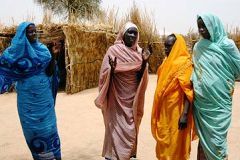Balanced approach needed to protect Darfur’s displaced- UNHCR
GENEVA, June 24, 2005 (UNHCR) — The UN refugee agency’s top official for international protection, Erika Feller, has returned from her mission to western Sudan’s Darfur region with mixed reviews and a strong belief in the need for more coordinated and nuanced efforts to better protect displaced people in the troubled region.

|
|
Displaced women discussing sexual violence around Garsila camp in West Darfur. Women who venture out seeking water and firewood are often attacked. (UNHCR). |
UNHCR’s Director of International Protection returned to Geneva today after a three-day visit to assess current protection efforts for some 700,000 displaced people in West Darfur province. Travelling with a team that included UNHCR’s Operations Director for the Sudan situation Jean-Marie Fakhouri, Feller visited several small villages, camps and settlements, including areas of return. The mission discussed with local authorities and humanitarian agencies the need to improve coordination and boost efforts to protect displaced people from further violence and displacement.
“Although there are signs of increased stability in some areas, the situation in Darfur continues to be marred by unpredictability, violence and threats to the security of the affected populations,” said Feller, summing up her findings from the visit.
Of particular concern, she said, is the situation of women who venture out of camps and villages to fetch water and firewood. Despite ongoing efforts to prevent sexual violence, rape incidents continue to occur. Other serious protection problems, including those affecting children, are not receiving as much attention, she added.
“Much lip service has been paid to all concerned to the importance of protection objectives, but a lot more needs to be done,” Feller told a group of aid agencies based in the West Darfur province, El Geneina. “Those involved in protection efforts must be given the resources to expand their presence and activities. Protection also has its costs. There is a gap here between the rhetoric and the financial support protection activities tend to attract.”
To date, UNHCR has received US$3.9 million out of the $31.3 million it needs for its Darfur operation.
On a more positive note, the UNHCR mission was advised about “pockets” in Darfur where improved conditions have led to some limited, spontaneous return movements. The refugee agency has identified several villages of return and is cautiously engaging in self-sufficiency activities to help the returnees re-establish themselves.
“This requires a carefully balanced approach, providing support to those who need it, while ensuring that these activities do not create any false impressions about the prevailing security situation and encourage additional movements in a situation not considered conducive to returns,” said Feller.
“A nuanced and carefully considered response” is needed to manage the complex situation where joint protection efforts in Darfur are taking place.
“Issues relating to ethnic conflict are inter-connected with competition over scarce resources in an extremely fragile natural environment,” explained Feller. “Tensions are further exacerbated by broken lines of contact between local communities and disrupted conflict resolution mechanisms. Conflicting political agendas of states add to the uncertainty with regards to the prospects for solutions to the conflict.”
She added, “In this environment, reconciliation at all levels is a key element for any sustainable improvement in the protection situation. Furthermore, it is crucial that the natural resources in Darfur are preserved to avoid further displacement and conflict, both in the shorter and longer term. The continued joint effort by the international community, working with the Sudanese authorities to protect the Darfur population, must be based on a thorough understanding of this dynamic.”
The UN refugee agency has three offices in Darfur – two in West Darfur and one in South Darfur – with more than 50 staff members, most of them focusing on protection work. Another seven field offices are planned.
